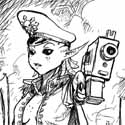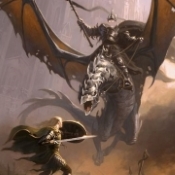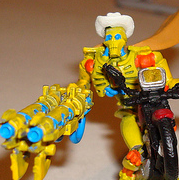|
wiegieman posted:I think part of the reason W&G failed is that their target audience has so much inertia with this weight of d100 stuff. Also from what I heard was that the first release had issues with the rules. And then apparently the development itself was handled so badly that GW pulled the plug way before any real support to it was given. Hopefully the C7 re-release will give it a second chance.
|
|
|
|

|
| # ? Apr 23, 2024 17:35 |
|
Hell, a major reason I never bothered to cover the final product of DH2e or OW is that there's just not much to say about them. They have exactly the same problems as the other games. They bolt on some new stuff, but nothing actually changed. Also wasn't Wrath and Glory developed by the same lead designer as Rogue Trader? If so, I can't say I'm surprised the rules didn't work great. RT had easily the worst system and was probably the worst overall game in the entire 40kRP line.
|
|
|
|
Night10194 posted:Also wasn't Wrath and Glory developed by the same lead designer as Rogue Trader? If so, I can't say I'm surprised the rules didn't work great. RT had easily the worst system and was probably the worst overall game in the entire 40kRP line. Possibly. Although it remains to be seen how much of the W&G system has changed or if C7 has just tried to patch up as many holes as possible in the rules. From what I've heard it's not going to be a huge change of the internal workings at least.
|
|
|
|
hyphz posted:Almost universally the games are actually based on an adult's view of being a teen, and probably a heavily filtered one - the same way Little Fears was clearly about adult perceptions of and fears for children. And that's... I dunno, I don't think there's anything wrong with that. That's also what's going on with It - a horror novel about adults reckoning with childhood trauma and moving past their childhood, a thing that only exists as memories of friends who were too perfect, adults who were too sinister, etc - and that's both thematically compelling and important to reckon with. Obviously mixing hobbies up with therapy is dangerous, but I think games like that could legit be helpful to people averse to thinking about their childhoods/teen years in some way. It's a weird thing to suggest, but then, even one of the best WoD games (Changeling: The Lost) is a pretty direct metaphor for abuse trauma.
|
|
|
|
Cooked Auto posted:Possibly. Although it remains to be seen how much of the W&G system has changed or if C7 has just tried to patch up as many holes as possible in the rules. From what I've heard it's not going to be a huge change of the internal workings at least. I think their plan is to use Age of Sigmar: Soulbound as the core of any changes they make.
|
|
|
|
One of the core things any 40k game has to decide is how much it's going to bother modeling the supposed disparities in power that exist in the fluff, versus doing what mostly happens anyway and going 'well you're all main characters, so there'll be reasons why you're all on the same page and who you are is mostly flavoring'. Because going with the former kind of doomed the original system and is also why it needed 4 entire gamelines to just play the various flavors of Imperial alone, which is nuts.
|
|
|
|
No. 1 Apartheid Fan posted:And that's... I dunno, I don't think there's anything wrong with that. That's also what's going on with It - a horror novel about adults reckoning with childhood trauma and moving past their childhood, a thing that only exists as memories of friends who were too perfect, adults who were too sinister, etc - and that's both thematically compelling and important to reckon with. I think it’s certainly good. We’re going to relate things to our own lives and experiences, after all, and one of the big issues with D&D is that it’s become so deep on itself that it forgets this. The original source material was a lot deeper than “just” escapism; LOTR has tons to say about the nature and cost of war, the needs of civilization and the environment, and our complicated relationship with change. It also, less positively, reflects racial and colonial attitudes at the time. (I’m sure D&D’s other source material is similarly complicated, I just don’t know it as well). D&D flees from confronting these things, leading to a lot of campaigns that are ultimately imperialism fantasies, even if people don’t see them that way. And very little in the official material I’ve seen confronts that or deconstructs the genre’s complicated history, even if it doesn’t indulge in it. But that doesn’t prevent people from relating D&D to their lives, it just means they’re less likely to do it productively. Tons of adults watch and read teen sex dramas, paranormal romances, and so forth. Having an RPG that emulates that genre and tries to do it in a healthy way seems great to me. I’d totally believe it can help people engage with their own trauma, but it also seems important regardless in not creating as many problems when people inevitably relate their hobbies to the larger world.
|
|
|
|
I'd be more offended by a teen supernatural RPG if it had all the stresses of real life scrubbed out. Like Stranger Things or Sabrina but everyone is upper middle class and all the class, gender, etc. issues are gone.
|
|
|
|
Ultiville posted:(I’m sure D&D’s other source material is similarly complicated, I just don’t know it as well). Well... not so overtly, at any rate. Probably D&D's biggest original influences—more so than Tolkien, really—were sword and sorcery stories by authors like Fritz Lieber and Robert E. Howard, and they... didn't have Tolkien's literary ambitions. I don't mean they were bad writers, or that they didn't put effort into their stories; I just don't think they had specific points they wanted to make about history and society the way that Tolkien did. That's not to say there aren't any themes to their stories or that they don't reflect the authors' worldviews, of course, but those themes aren't as close to the surface or as consciously developed as they are in Tolkien's writings. Those stories really are closer to pure escapism than Tolkien's epics.
|
|
|
|
Conan has really direct, often blatant themes, though? Howard has a lot to say, sometimes artlessly, about civilization and ‘barbarism.’ And that arrived in D&D in a worse way than it appeared in Conan.
|
|
|
|
uhhh Howard's work in particular puts forth a deep Lost Generation pessimism about the worth of civilization itself, and they are not "far from the surface" at all. What really sets Tolkien apart and made him the [business] model for future authors is that he more or less invented what we now call "worldbuilding." Howard and some other authors mapped out their fictional worlds too, but they didn't literally publish the map like Tolkien did.
|
|
|
|
Joe Slowboat posted:Conan has really direct, often blatant themes, though? Howard has a lot to say, sometimes artlessly, about civilization and ‘barbarism.’ And that arrived in D&D in a worse way than it appeared in Conan. Fair enough; I admit I haven't read much Howard. Though again, I wasn't saying there weren't themes in those stories, just that they weren't as consciously developed as in Tolkien's—I don't think Howard set out with the intention of writing stories about civilization vs. barbarism; that just sort of came into his stories because of who Howard was and his mindset. I certainly don't think Howard's writing is as "deep" or "complicated" as Tolkien's in the sense that Ultiville was talking about. You can certainly find themes in Lieber's stories, too; they're full of casual cynicism and distrust of authority. But again, I don't think including those themes was a main priority for him the way Tolkien's themes presumably were for him. Any writing is going to include some sort of themes and reflect the authors' mindsets, because authors are people and they have prejudices and opinions both conscious and unconscious. But some authors intentionally weave those themes into their stories more than others. And in this regard I just don't think Howard and Lieber are nearly on Tolkien's level. I don't mean in terms of writing quality—I'm not really a big Tolkien fan, and I think Lieber was a good writer—but just in terms of how much thematic depth they consciously put into their stories. But yeah, whether the themes are put into the stories consciously or not, they're still there, and yeah, Howard's imperialism probably is reflected in D&D.
|
|
|
|
I can’t speak to Lieber but I think you’re selling Howard short; if anything, he was more immediately willing to express themes with modern correlates than Tolkien, who insisted that his works be read non-metaphorically. His deep hostility to allegory resulted in a lot of racial tropes that he didn’t appear to intend being not just near the surface but on it, and D&D picked up on what Tolkien’s orcs clearly represented (the threatening racial Other) even while he insisted that there was no such connection to be made. Howard just said the racism he meant. Anyways you can say you think Tolkien developed his themes better than Howard, but Howard has a specific thematic concern and set of concerns in his Conan stories, just as Moorcock would after both of them. Various Conan stories worked out these themes to various lengths and in various combinations, and I think saying ‘well that was just who Howard was’ is not more applicable to him than to Tolkien, even if Tolkien was an academic setting out to write a new Beowulf and Howard was a pulp author setting out to write a new swashbuckling story. E: put another way, Howard’s themes and intent are no less clear and direct than his contemporary author HP Lovecraft, whose themes were often grotesque but were very clearly carried out in his best stories with clear intent and construction.
|
|
|
|
Jerik posted:Fair enough; I admit I haven't read much Howard. Though again, I wasn't saying there weren't themes in those stories, just that they weren't as consciously developed as in Tolkien's—I don't think Howard set out with the intention of writing stories about civilization vs. barbarism; that just sort of came into his stories because of who Howard was and his mindset. I certainly don't think Howard's writing is as "deep" or "complicated" as Tolkien's in the sense that Ultiville was talking about. Howard straight up writes "Barbarism is the natural state of mankind. Civilization is unnatural. It is a whim of circumstance. And barbarism must always ultimately triumph." in Beyond the Black River. The man grew up in the oil fields of Texas after WWI, and it shows in every inch of his writing. If you want a better RPG about civilization vs barbarism, look into Ikuisuuden laakso ("Valley of Eternity"), a TTRPG about the same topic but set in the Antarctic with cute penguins. golden bubble fucked around with this message at 19:11 on Nov 7, 2019 |
|
|
|
Not to mention that his particular model of ‘barbarism’ is a complicated historical fiction no less elaborately worked out than Tolkien’s image of Middle Earth’s dynamics. Also lol I just remembered that Tolkien was totally cool with allegory when it came to dwarves being Jewish (from a fairly sympathetic but very gentile perspective) he just got cold feet when people compared the War of the Ring to WWII or suggested orcs might correspond to real people.
|
|
|
|
Orcs also rubbed up hard against Tolkien's Catholic beliefs. I think he had some really ugly and messy worldbuilding to bridge the gap between the always-evil orc depictions and his need to make sure that every individual could potentially embrace God.
|
|
|
|
Yeah, OK, never mind; as I said, I hadn't read much Howard, and I guess I had a mistaken impression about him and didn't realize how overt his themes are. Or actually, I think it's more that I was trying to draw a distinction between Tolkien's writing around his themes and themes entering into Howard's and Lieber's stories without their really being the point of the stories—but yeah, you're probably right that that's not a meaningful distinction, or maybe even a real distinction at all. As for Lieber, I wasn't trying to sell him.short; as I said, I think he was a good writer; I just don't think he was overt about his themes as Tolkien (and apparently Howard)—but to be completely honest it's been a while since I've read his stories and it's entirely possible I'm misremembering or that there are just things that I missed, so I could be wrong about him too.
|
|
|
|
golden bubble posted:Orcs also rubbed up hard against Tolkien's Catholic beliefs. I think he had some really ugly and messy worldbuilding to bridge the gap between the always-evil orc depictions and his need to make sure that every individual could potentially embrace God. The story I'd heard is that he had a bunch of notebooks explaining how Mordor's economy and government functioned to produce the orcs we see on the page, who are effectively always evil. The one thing I remember clearly is that Mount Doom produces volcanic ash that creates a very fertile region where the orcs produce all their food, which is how he explained the giant armies of orcs that keep showing up with no apparent larger orc society producing them. But yeah, he had a weird combination of racism (at the very least, reproducing xenophobia if not modern racism from Old English sources he used as inspiration) and Catholic universalism going into orcs, which was more than a little messy.
|
|
|
|
And of course what's really frustrating is there are a huge number of successor works that could address this interestingly, but it's pretty rare that we get anything better than Warcraft's treatment, which intermittently mixes in some noble savages and a bit of ham-handed reference to American slavery. Which is still better than D&D, which goes back and forth on orcs specifically, but still tries to justify species-based killings on the regular, like the gnoll treatment in Tome of Foes, devils and demons, etc.
|
|
|
|
Don't forget Lovecraft and Howard more or less broke up over their mutual love of pessimistic fascism because HP was like "civilization is the only metric of worth and sanity!" and Howard believed "trust nobody, only your own fists and living a life of barbarian badassery will protect you".
|
|
|
|
Howard only disliked civilization because he was pro-lynching of black men and had issue with courts preventing that.
|
|
|
|
Monsterhearts 2: Final Chapters Back to Monsterhearts, with the final chapters of the book. Chapter 6: Making it Your Own They start the chapter by noting that while you can and definitely should change things up, the Skins were balanced around providing a certain play experience and you should make sure you get how the pieces fit together before you add or change any of them. The next bit is on the most obvious change, doing something other than a high-school game. They lay out the sorts of notes you want to try and hit with a different sort of game, that at some level things should echo a lot of the emotional realities of high school in order to really hit the feel of the game. But I mean alienation and petty social politics work just about anywhere if you do it right. Make sure you come up with an appropriate version of the seating chart, it’s an important element of getting the story going. They next move to the idea of messing with the core mechanics like basic Moves. This is definitely something that requires a lot of thought, because the flow of the game and resources will be substantially altered if you do it. They give a good example of how the balance of options could change radically if you eliminated the rules for Skirting Death, by making things that inflict Harm much more powerful and giving characters who are good at it much more leverage. They next give a general formula for writing Moves. Come up with a trigger, then what happens. They also lay out some things to think about when adding rolls and choices to avoid making Moves too complicated. They have a section briefly discussing the Skins, and how each is built around a different sort of economy some of which are shared and some of which are specific to the Skin. This is building, obviously, on the idea that you really should know how the Skins are supposed to work before you change them. They also lay out the individual pieces of a Skin, which is important in the event you want to create your own. Because why wouldn’t you? They have a list of questions to consider when doing so. They also note that you should keep watch on whether some new Skin you’re creating has really similar economies to one that exists, because you might just be able to reskin and change some things like the Darkest Self and Sex Move around and save yourself some effort. For changing the MC toolkit, they note that it’s going to make the game feel a bit different and if that’s what you want then go for it. Chapter 7: Taking Inspiration They start with a long play example that builds on the prior examples they’d been giving throughout the book. They then give a very specific set of media inspirations to watch and listen to, should you desire. It’s solid. That’s the book. So, there’s still some stuff left! I’m going to go through and talk about some Move synergies and builds and such, talk about some of the crazy rude poo poo you can get your character doing. I’m also going to talk about the Small Towns they provide as ready-made settings in a post. But first, we’ll do The Cerberus.
|
|
|
|
Gerund posted:Howard only disliked civilization because he was pro-lynching of black men and had issue with courts preventing that. Ooof. I don't doubt you, but do you have a source for this?
|
|
|
|
LeSquide posted:Ooof. I don't doubt you, but do you have a source for this? 'One Who Walks Alone' by Novaline Pryce
|
|
|
|
Robert E. Howard in Wings in the night posted:The ancient empires fall, the dark-skinned peoples fade and even the demons of antiquity gasp their last, but over all stands the Aryan barbarian, white-skinned, cold-eyed, dominant, the supreme fighting man of the earth. Or how about "The last white man" in which the perfidious black race has overthrown the complacent and lazy whites and the hero is a blue-eyed blonde turboviking
|
|
|
|
Night10194 posted:Because let's all be honest with ourselves here. Here in F&F, we talk about rules. A lot. But you know what? Rules-quality is not the main thing that moves products in this industry.  Keeps me up at night/makes me extremely mad/etc. Keeps me up at night/makes me extremely mad/etc. wiegieman posted:40k rpg is in this weird place right now where everyone who still plays it is familiar with all the nooks and crannies of the systems and can make the different games work together. I think part of the reason W&G failed is that their target audience has so much inertia with this weight of d100 stuff. WnG had neither the rules nor the presentation. The book is loving drab. I have no issue with 40K having different RPG lines, but that's because I'm one of the three people who prefer any given 40K group not to be The Most Liberal Rogue Trader's Xeno Super Friends. I like things getting siloed off and getting rules that deal with their specific situation. Like, something that gives you deep rules to run a Space Marine rather than some generic system that tries to put Guardsmen and Commissars on the same level. Speaking of Guardsmen, is there an RPG where you actually control a squad/squadleader instead of a single dude? JcDent fucked around with this message at 13:08 on Nov 8, 2019 |
|
|
|
JcDent posted:Speaking of Guardsmen, is there an RPG where you actually control a squad/squadleader instead of a single dude? IIRC, Albedo? There's a F&F of it in the archives.
|
|
|
|
Yeah, the whole thing of Albedo is that each PC is a squad leader. I believe there's also a general version of Albedo's rules for military sims, called Magenta, sold separately if you don't care for Existentialist Furry Space NATO as the setting. Honestly I would have liked to have seen Albedo's version of Cardinal get more development; Albedo's always been pretty tense and evocative whenever I've played combat gameplay in it and it works pretty well as a crunchy wargame-like RPG that's tracking everyone's mental state. But it is really hard to run. There's a lot of stuff to keep track of and you have to carefully design terrain and ranges and things because drat, if you get caught out of cover in front of a rifle squad you are just dead. Night10194 fucked around with this message at 14:14 on Nov 8, 2019 |
|
|
|
No. 1 Apartheid Fan posted:Obviously mixing hobbies up with therapy is dangerous, but I think games like that could legit be helpful to people averse to thinking about their childhoods/teen years in some way. It's a weird thing to suggest, but then, even one of the best WoD games (Changeling: The Lost) is a pretty direct metaphor for abuse trauma. It's not weird at all to consider and think about the media you consume as helpful to you and your understanding of yourself, it's media 101. Yeah, as therapy no, but just as a thing that makes you consider your experiences? Not weird at all. Like, the movie Annihilation is only powerful and as good as it is to some people because it gets you to think about certain topics and that same thing makes it almost impossible to recommend because you can't really open up with "hey, this movie is good, it made me think about how my grandpa died and I cried for 2 hours afterwards" because that's such a personal experience.
|
|
|
|
Nobilis 2E It really took me a while to get back to this. Sorry, but I haven't given up yet. 20 Pages of Wasting My Time So the 20-page example-of-play. It has issues. Now, generally an example-of-play should A) give players and GM an idea of the atmosphere they should expect and B) hopefully help clarify some things like order of resolution, give some suggestions for descriptions, etc. etc. You know, be an example of how the game runs that clears up some commonly-asked questions and stumbling-blocks, like a FAQ for running the game. This example-of-play has two issues. Firstly, there's the fact that it feels extremely like something that's written by just one person who writes like an Exalted author, very rarely does the dialogue from the players or their OOC chatter feel much like anything you'd actually expect from human beings. It also contains the usual serving of extremely unhelpful prose like "a clawed finger that can cut through anything, including light and beauty." Well play, that sounds very dramatic, but what does "cutting through beauty" actually mean? Congratulations, you've wasted everyone's time with something poorly-defined. Which seques nicely into the second issue, about poor definitions, which is that basically every time the GM rules on something it feels like an extremely hasty off-the-cuff adjudication, only rarely like something founded in listed mechanics(and even when it is, it's not really explained. occasionally a page is referenced, but if anything that's vaguer than anything in the example-of-play). At one point the GM says "glick" in response to something that's probably supposed to be funny and my brain just got stuck on it because who the gently caress uses "glick" as an expression of mirth? In short, it's not exactly a good use of anyone's time to read this. It also doesn't help that for every page of example-of-play there's a half page of dense purple prose fluff. Don't Traumatize Your Players Non-Consensually Joking aside this part starts pretty okay, by basically going: "don't creep someone out or poke at their trauma, not even if it would be 'in-character', jackass." A general plea towards making playing the game as enjoyable as everyone, and pointing out that your GRAND ARTISTIC VISION is less important than everyone having a good time. quote:It doesn’t matter if the discomfort is reasonable. If a player is severely arachnophobic, you may have to abandon your grand giant spider-based plotline. It doesn’t matter if you find the idea uncontroversial; it makes the player nervous. That’s all that matters. It's slightly sabotaged by suggestion that a variation on this for a "mature group" where everyone would just have to "grin and bear it." Which, uh, I don't like. These limits are specifically meant to be for stuff that someone can't "grin and bear" because it's something that touches them in a place they're fundamentally uncomfortable with, where it isn't just a mild inconvenience or a thrilling play with boundaries, but something that absolutely weirds them out or recalls trauma. On to the next page where I actually really, really agree with the Nobilis author on something, which is that you never take away player autonomy or control over their character. You can describe that they have an urge to do something, or describe something in very favourable terms that make the player want to do it, but if the player says that's not what their character does, then that's not what their character does. The book also suggests that you shouldn't have rape in your games, and if you really think it's a good idea, for God's sake vet it with your players first, you jackass. Same goes for excessive gore, violence or torture, or sacrilege. No comment on whether "ethnic cleansing is your hobby" should be vetted with players first or if people should be free to start loading Albanians into furnaces on day one, page one of the game. No, I'm still not over that loving part of the book, and I don't think I ever will be. Oh poo poo, It's A Rule Or, Chapter 9, where we actually get some rules and numbers defined in anything but the most vague ways, though honestly still in some pretty vague ways a lot of the time. This is where we actually get started on the building blocks of making a character: Aspect, Domain, Realm and Spirit being the main mechanical traits, their ratings affecting both what you can do with them, and how many points you have to burn to do extra cool stuff with them, if I'm reading these rules right. I confess that I may miss some parts because the rules really love to repeat themselves and cram in large amounts of barely-related fluff and examples in between every two paragraphs of text. Firstly, there's the Aspect, your physical capabilities(both intellectual and raw power), which honestly feels like an early write-up of Solars in that it covers "how to be human except better at all things humans do." "If a human can do something, Aspect can do it … a thousand times better." "If a mythical character can do something without magic, Aspect can do it." The first two rules on Aspect are very good rules of thumb, really, and come with decent examples. Then there's the third one... "If it makes good myth, and fits Aspect’s style, then Aspect can do it." Which isn't really a guide in any way except "if it's cool let the player do it," kind of undermining the two previous points setting up limitations. There's also a huge list of extremely specific limitations on things that Aspect can't do: quote:0 Aspect cannot silence a gun. It's funny that the first thing is literally one of the ones I could totally see justified by rule three as "rule of cool" where the superstrong, supertough guy wraps his hand around the end of the gun barrel, muffling the noise of the shot with his own meaty muscles. quote:0 Aspect cannot douse an area in darkness. Some of them feel like they're just there to shut down one specific player who tried something. quote:0 Aspect cannot provide social influence among Powers. Others, again, sound very much like the fundamental guidelines for what a Solar charm should and should not let someone do. quote:0 Aspect cannot provide planning intelligence above the player’s. And this, I gotta say, rankles me a bit. Like what's the harm in the HYPER INTELLECT GUY getting a small hint from the GM if he overlooks something obvious that his character logically wouldn't? As long as it doesn't turn into the GM handing him a fully-fledged plan out of the blue, this one just feels a bit mean-spirited. quote:0 Aspect cannot make someone’s head explode by looking at them. Ah yes, the great heroic spirit stymied by a busy phone line. Some of these specific "no, you cannot do this"-examples continue to baffle me. For some reason Aspect, the great "MORE HUMAN THAN HUMAN"-stat, also defines your ability to shapeshift into something appropriate to the local environment(like a giant in Jotunheim, a giant squid deep under the sea, etc.), which feels odd. Unless "cosplaying very convincingly" is a fundamental human ability. Anyway, next up is Domain, which is your magical magic tied to your estate. Essentially you get one or two key words and with regards to them you can: Divine, Preserve, Destroy, Change(Destroying and Changing are somewhat interchangeable since you can "Destroy" specific parts of a thing rather than the whole thing, like you can Destroy the part of the Tree estate that allows Trees to be flammable) or Create, with Divining and Preserving as the easiest, while Creating, Changing and Destroying are hardest. This leads to a situation where until you're above rank 2 in Domain, you get to perform amazing feats like "reading a closed book," knowing when it's going to rain or protecting a single tree. Not exactly vast, evocative powers of legend. At this point, with Aspect, you're already able to, say, out-calculate computers and punch rocks apart with your bare hands. Obviously at high levels, your Domain lets you do stuff that no level of superhuman power lets you do, really breaking the conventional rules of reality, but in simple terms of "able to do stuff that contributes to the story," Aspect pays off much more quickly. Realm is specifically being able to control your boss' little pocket dimension. This means you can be real powerful as long as you can hide in there and lure enemies in there, but once you actually leave, Realm is a completely useless stat that serves no purpose. Earlier parts make a big deal of how adventures could be set entirely inside the pocket dimensions, but if that happens then you run into the issue that Realm trumps anything else in terms of usefulness and power, so it's kind of the classic issue of a specialization that's either useless or game-trivializing with little-to-no middle ground. Spirit is a weird combination stat of Magic Resistance, Magic Stealth and how many closely bound mortal servants you're allowed to collect. Since there's no random factor involved in using your magic powers, you basically "bid" a number of miracle points equal to how much Spirit you want to kick through in case anyone supernaturally protected is in the AoE of your miracle, and hope you sacrificed enough to kick through their spirit shield(yes, it has a proper noun name, no, I'm not going to write it out). This, of course, gets a bit odd with regards to the player characters since the GM will always know what their magic resistance is, and I'm not sure whether the GM is just supposed to occasionally low-bid to keep up a pretense of NPC's not being omniscient or what. The writing seems to imply that PC's should not specifically know what they're bidding against. Your magic resistance also helps you resist various snooping ritual magic trying to figure out if you're the one who replaced an entire forest of redwoods with stop signs and similar shenanigans. Chapter 10 is where the remainder of chargen hides, which is where, rather than vague guidelines on what coolstuff you can do, you actually have defined powers. So rather than having Aspect 9 and waving aside swords because that's what you do with Aspect 9 among many other things, for instance, you have a power specifically called Durant that specifies that it's for ignoring swords and chainsaws and healing real good, even if your Aspect isn't specifically high enough to make you functionally immortal. Some of these are more evocative and interesting than the extremely vague things that the Domain words provide, but also feel tied to more conventional fantasy since they explicitly call out stuff like "this is what a Vampire" would have or "this is fire breathing for a dragon specifically," etc. A few are pretty creative, like the ability to always be just in time, which is kind of a neat narrative power, where reality will make sure you're never too late to accomplish something(even though you might fail after you arrive), so you can theoretically take on endless sidequests and fate will just keep delaying the main villain's plot to destroy the world(it's not an infallible power, some things can prevent it, but it's still a funny one). Some of this also feels like it was designed entirely separate from the Domains part, or by someone else since, for instance, there's a specific Gift that gives you Domain-esque powers, just at a middling level. It's effectively useless if you ever plan to invest even slightly into your Domain, but if you don't, partially replaces what you'd want to be using your Domain score for. Also, these various "Gifts" are each related to a character trait(Spirit, Aspect, Domain, Realm, etc.) and there's all of one for Realm, kind of hammering home how vestigial this stat is. Here we're also introduced to the RITES which can be summarized as "rite of mild magic detective work," "rite of magical torture" and "five different rites for Nobilis versions of Diablerie." You also get to pick some limitations during chargen, half of them are stuff that give you a permanent chargen point boost, while the others are stuff that recharge your miracle points whenever they inconvenience you. An example is "cannot cross running water," if being unable to cross a river actually makes you late for something or otherwise makes you miss an opportunity, it gives you a free recharge on miracle points. I like this approach to limitations, carrot rather than stick, it's quality. You can also choose to have an alignment. Angels(pretty is good, justice is pretty, mortals should serve you), Hell(corruption is good, suffering is corruption, power is good also), Light(protect humans), Dark(convince humans to kill themselves) or Wild(I'M CHAOTIC NEUTRAL! RAAAAAAAAAAAARGH!) and like the various limitations, "high service"(undefined or vaguely defined, of course) to your alignment gives you a free miracle point. Next: Secret Clubhouse Design
|
|
|
|
So what the gently caress is the point of that list of 0-aspect things? Is it meant to suggest that once you get one shiny point of Aspect you can do all of those things?
|
|
|
|
|
Nessus posted:So what the gently caress is the point of that list of 0-aspect things? Is it meant to suggest that once you get one shiny point of Aspect you can do all of those things? Oh no, that's the list of things you can NEVER EVER DO with Aspect.
|
|
|
|
I'm guessing it's a bullet list and the copy/paste formatted the dot as a 0.
|
|
|
|
Yeah, this reeks of stuff that makes me want to stay away from the game. Don't tell me you're all about the narrative freedom of the mythic characters and then go on a tear about how I'm not allowed to leave your walled garden.
|
|
|
|
PurpleXVI posted:Well play, that sounds very dramatic, but what does "cutting through beauty" actually mean? Congratulations, you've wasted everyone's time with something poorly-defined. Which seques nicely into the second issue, about poor definitions, which is that basically every time the GM rules on something it feels like an extremely hasty off-the-cuff adjudication, only rarely like something founded in listed mechanics (and even when it is, it's not really explained. occasionally a page is referenced, but if anything that's vaguer than anything in the example-of-play). I'm not really sure what ruling you could make on "this weapon can cut through anything, even abstract concepts" that works in all cases. That's something you have to deal with case-by-case — I can't think of an alternative that wouldn't be a lot less entertaining! Although, I can't really think of a good way to slice through beauty abstractly either. More useful at the table is figuring out what happens if somebody slices through the next five minutes. quote:In short, it's not exactly a good use of anyone's time to read this. This is interesting, because the Sample of Play was historically the most popular part of the book and people complained bitterly when 3e didn't have one, to the point that Glitch is going to have a very large one. quote:I confess that I may miss some parts because the rules really love to repeat themselves and cram in large amounts of barely-related fluff and examples in between every two paragraphs of text. I actually think the constant examples are really helpful to people who are trying to build a character, particularly the examples of characters with each level of each ability. It's useful context (although not quite as important for Nobilis, which has fairly standard god-powers, as it is in a game where you play a weirder character type like the Excrucians.) quote:And this, I gotta say, rankles me a bit. Like what's the harm in the HYPER INTELLECT GUY getting a small hint from the GM if he overlooks something obvious that his character logically wouldn't? As long as it doesn't turn into the GM handing him a fully-fledged plan out of the blue, this one just feels a bit mean-spirited. I don't know that it would break anything if you could do this, but can't Aspect already do a huge whack of things already? quote:Ah yes, the great heroic spirit stymied by a busy phone line. I have to admit, I have not forgotten the bit in my actual game many years ago, when a group of immortal gods were completely stymied by a comedy scene involving an automated help line. Second only to the recent scene in Glitch playtesting where a group of world-killing lords of emptiness (retired), feared by gods and men alike, utterly failed to climb up an icy set of stairs. quote:Realm is specifically being able to control your boss' little pocket dimension. This means you can be real powerful as long as you can hide in there and lure enemies in there, but once you actually leave, Realm is a completely useless stat that serves no purpose. Earlier parts make a big deal of how adventures could be set entirely inside the pocket dimensions, but if that happens then you run into the issue that Realm trumps anything else in terms of usefulness and power, so it's kind of the classic issue of a specialization that's either useless or game-trivializing with little-to-no middle ground. Realm-stuff doesn't fade if it leaves the Realm or anything, so having a bunch of Realm will also let you drop in at home and conjure up pretty much anything you happen to want, or do tricks like bringing injured mortals home for miraculous treatment you couldn't provide elsewhere, so it serves as a kind of resources stat. But yeah, it's kind of limited, which is why it didn't survive the move to 3e. quote:Spirit is a weird combination stat of Magic Resistance, Magic Stealth and how many closely bound mortal servants you're allowed to collect. Since there's no random factor involved in using your magic powers, you basically "bid" a number of miracle points equal to how much Spirit you want to kick through in case anyone supernaturally protected is in the AoE of your miracle, and hope you sacrificed enough to kick through their spirit shield(yes, it has a proper noun name, no, I'm not going to write it out). This, of course, gets a bit odd with regards to the player characters since the GM will always know what their magic resistance is, and I'm not sure whether the GM is just supposed to occasionally low-bid to keep up a pretense of NPC's not being omniscient or what. The writing seems to imply that PC's should not specifically know what they're bidding against. Your magic resistance also helps you resist various snooping ritual magic trying to figure out if you're the one who replaced an entire forest of redwoods with stop signs and similar shenanigans. Spirit is pretty bland and passive, yeah. It tries to make up for this by being a very powerful kind of passive (really it's almost ludicrous), but in the end, it's pretty dull, which is why it, too, got replaced in 3e. quote:Here we're also introduced to the RITES which can be summarized as "rite of mild magic detective work," "rite of magical torture" and "five different rites for Nobilis versions of Diablerie." In general you can just make up new Rites for any "general magical thing you think the Nobilis ought to able to do," but I don't know that that happens very often. wiegieman posted:Yeah, this reeks of stuff that makes me want to stay away from the game. Don't tell me you're all about the narrative freedom of the mythic characters and then go on a tear about how I'm not allowed to leave your walled garden. I mean, it's already a vastly broad ability; it has to have some limitations.
|
|
|
|
Rand Brittain posted:Realm-stuff doesn't fade if it leaves the Realm or anything, so having a bunch of Realm will also let you drop in at home and conjure up pretty much anything you happen to want, or do tricks like bringing injured mortals home for miraculous treatment you couldn't provide elsewhere, so it serves as a kind of resources stat. I'm pretty sure the book specifically mentions that anything created in the Realm or impossible in the real world rapidly fades in the real world, unless maintained by a constant infusion of the creator's power, or lacks its wondrous capabilities in the real world. Nobilis 2E posted:Created things fade upon leaving the Chancel unless sustained with rmps. If they depend upon magic or technology that works only within the Realm, they will not function on Earth, sustained or no. And Rand Brittain posted:I'm not really sure what ruling you could make on "this weapon can cut through anything, even abstract concepts" that works in all cases. That's something you have to deal with case-by-case — I can't think of an alternative that wouldn't be a lot less entertaining! The problem with something that ill-defined, where it's really just mashing together two words that sound cool in a dense purple prose way, is that applications essentially turn into interpretation battles. The GM doesn't know what the ability can do, so they can't in any way prepare for it or have interesting responses to it, as the player can make up any level of bullshit. At least most other things in the book are in some way defined and limited so that using those abilities or resources requires thinking and some amount of creativity, not just a dictionary full of adjectives. Even if it's closer to cooperative storytelling than a game, limitations are what make things interesting, how the story and characters work with and around them, not when someone's handed a Calvinball Card and says they win because they're standing on sand on a thursday.
|
|
|
|
PurpleXVI posted:The problem with something that ill-defined, where it's really just mashing together two words that sound cool in a dense purple prose way, is that applications essentially turn into interpretation battles. The GM doesn't know what the ability can do, so they can't in any way prepare for it or have interesting responses to it, as the player can make up any level of bullshit. At least most other things in the book are in some way defined and limited so that using those abilities or resources requires thinking and some amount of creativity, not just a dictionary full of adjectives. I'm not really sure what you're saying. How would a "dictionary full of adjectives" help?
|
|
|
Rand Brittain posted:I'm not really sure what you're saying. How would a "dictionary full of adjectives" help? While this is probably less of an issue in narrative-style games than it would be if you gave someone in a D&D setting a drawback-less, chargeless tool that lets them kill or destroy any item they see, it doesn't necessarily INSPIRE anything either. It also creates an environment where the GM has to operate in the free-wheeling improvisational style, which is a limitation because some people can do that OK, some people do it wonderfully, and some people don't do it well at all. In this context, having established limitations on the Cut Anything power, even if they are merely practical ones, gives the GM space to plan and present meaningful choices and challenges which don't boil down to "nuh uh, this guy can't be cut" (which you might be able to get away with for one signature bad guy without it feeling cheap) or "aha but uh when you try to use your ability, SOME BULLSHIT HAPPENS and now A BAD THING!" e: To more directly address the adjective thing, this is like saying "your power is to Cut Anything you can define," at which point you can use this power for everything. "I cut away his addiction to shitposting." "I cut away the bonds that hold her back." "I cut away the chemical bonds between the HFC atoms in the Antarctic atmosphere, allowing Sodium Lad's power to create atomic sodium at will to create harmless salt while healing the ozone layer!" Nessus fucked around with this message at 23:32 on Nov 9, 2019 |
|
|
|
|
I dunno, I feel like if you're not into wacky free-wheeling improvisation where players have insane power mostly limited by their creativity then you should play other good games. Nobilis just isn't for everybody. It should probably say that on the cover, but I think it does a good job conveying it with the twee pixie dream girl writing. I see no problems with a knife that can cut anything you can define or any of those applications for a Nobilis game. You're playing people who can enter the tomb of horrors and leave it a dinosaur themed Italian restaurant. Your challenges are mostly, "what do you want to do with your incredible power? Cure cancer? Great, done, no more cancer in the world. The God of Pointless Suffering is leaving you angry messages now" or "the color red is under attack, defend it!" or "tea party, everyone be twee at each other for 3 hours. This is what you really wanted."
|
|
|
|

|
| # ? Apr 23, 2024 17:35 |
|
If the argument here is that TTRPGs shouldn't have stuff like "Knife that can cut through anything, even abstract concepts like 'beauty'," because despite their presence and successful implementation in many works of fiction, the interactive nature of TTRPGs and the almost-invariably semi-competitive nature of the player-GM relationship makes them inevitable sources of strife during play, I feel like the only answer is "But what about people who like that sort of thing in fiction and want it in their games?" It's in the source material. It's hard to make work in play, but it's in the source material; some players and some games are going to prioritize putting-in-the-poo poo-from-the-source-material-we-like over eliminating potential player/GM strife points. Not every game has to be written for every audience.
|
|
|







































